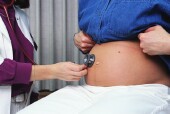
WEDNESDAY, March 20 (HealthDay News) — Women who were physically, emotionally or sexually abused as children are more likely to have a child with autism, a new study suggests.
For women who suffered the most severe abuse, the risk more than tripled, the researchers found.
“This is a completely new risk factor for autism,” said lead investigator Andrea Roberts, a research associate at the Harvard School of Public Health.
“Child abuse has a horrible effect on individuals who experience it, but the effects might reach across generations,” she said. “The more abuse a woman had been exposed to in her own childhood, the more likely she was to have a child with autism.”
Even women who experienced moderate levels of abuse were 60 percent more likely to have a child with autism, she added.
Although this increased risk seems high, the absolute risk of autism associated with a mother’s exposure to abuse in childhood is very low, Roberts said.
In women who were not abused as children, fewer than one in 100 of those children had autism. Among women exposed to the highest level of abuse, two in 100 of their children had autism. “So, most of their kids don’t have autism,” she said.
Roberts cautioned that these findings only show an association.
“We can’t assert cause-and-effect,” she said. “The puzzle is to figure out what could be causing this association.”
Dr. Andrew Adesman, chief of developmental and behavioral pediatrics at the Steven & Alexandra Cohen Children’s Medical Center of New York, agreed that the unanswered question is how a mother’s abuse might be linked to her child’s chances of having autism.
“The association seems clear. What is not clear is why it’s there,” he said.
The report was published online March 20 in the journal JAMA Psychiatry.
On Wednesday, the U.S. Centers for Disease Control and Prevention released a new report that found that 2 percent of children in the United States have autism, which is an increase from 2007, when the prevalence was 1.16 percent.
Interestingly, the same 2 percent prevalence of autism is exactly what Roberts found for the children of women who had been abused in childhood.
Roberts’ team collected data on more than 50,000 women who took part in the Nurses’ Health Study II.
Although not many of these women experienced severe abuse as children, many were moderately abused, the researchers found.
In fact, only about 2 percent of the women said they had experienced severe abuse, yet even the women in the top 25 percent of those who experienced moderate levels of abuse had a 60 percent chance of having a child with autism, they noted.
To be sure abuse was a critical factor, Roberts’ group looked at other risk factors known to be associated with autism, including diabetes during pregnancy, high blood pressure during pregnancy (preeclampsia) and smoking.
Although the abused women did have a higher risk of experiencing one of these other risk factors, it accounted for only 7 percent of their increased odds of having a child with autism, the investigators found.
The researchers speculate that the long-lasting effects of abuse on their immune system and stress-response system might be responsible.
Another expert, Dr. Roberto Tuchman, director of the autism and neurodevelopment program at Miami Children’s Hospital Dan Marino Center, thinks the importance of this study is that it pinpoints another group of children who might be at risk for autism.
“The study has identified an at-risk population,” he said. “This is a population we should be more aware of as being in need of early identification and intervention.”
More information
For more on autism, visit the U.S. National Library of Medicine.

